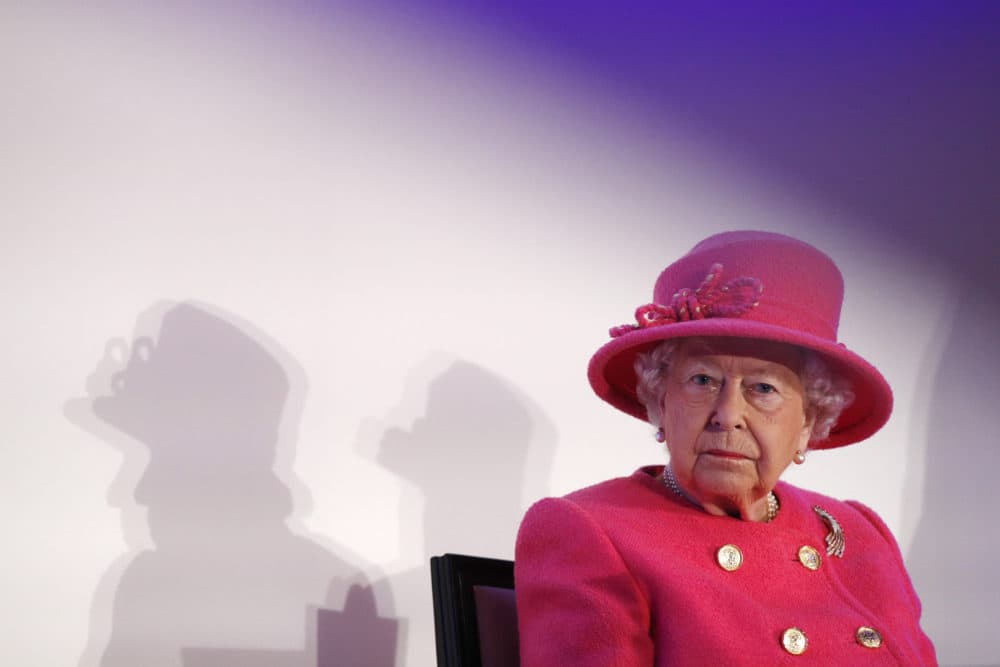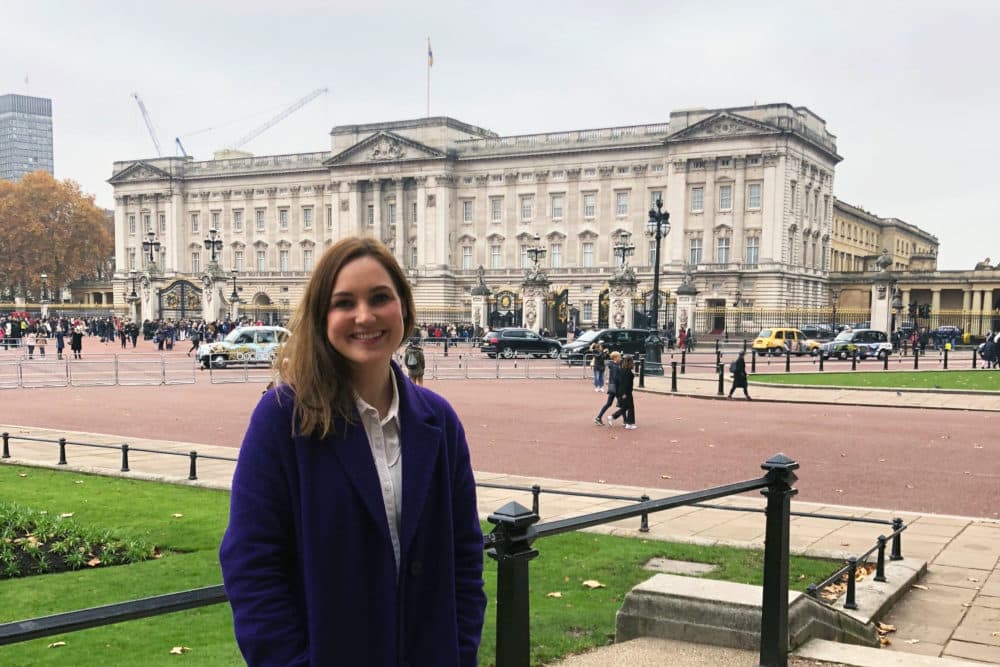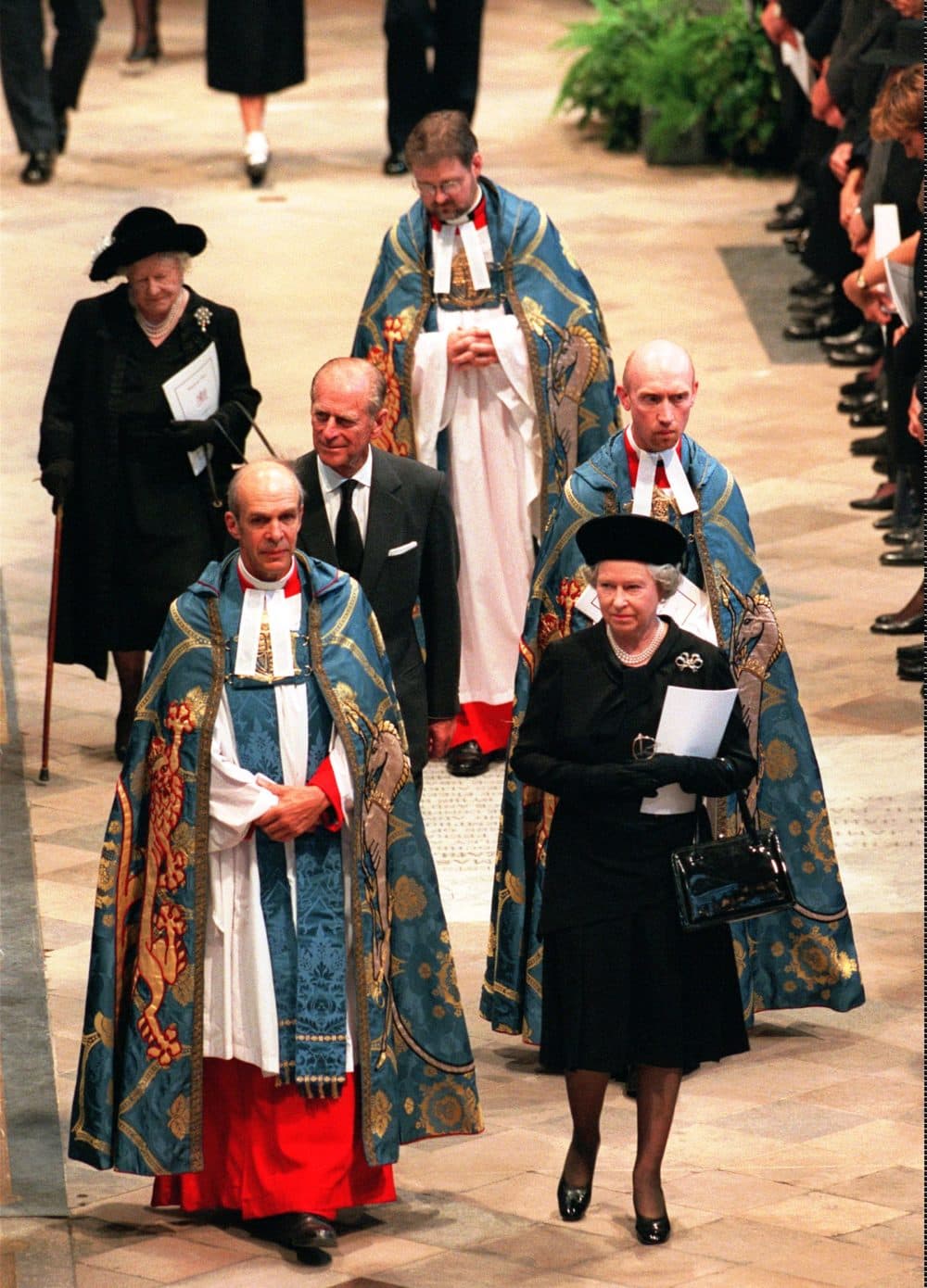Advertisement
Queen Elizabeth II: The Life And Legacy Of Britain's Longest-Serving Monarch

Queen Elizabeth II is 92 years old and has been on the throne for 66 years. In 2015, she surpassed Queen Victoria as the longest-serving British monarch in history. And by and large throughout her decades as queen, she has remained “incredibly popular,” according to Victoria Murphy, former royal correspondent for The Daily Mirror and author of "Sixty Glorious Years: Our Queen Elizabeth II - Diamond Jubilee 1952-2012.”
“Those years of service that she has given to the country I think people do really recognize and do really respect that she has put duty first, and she has continued to do that for so many years,” Murphy (@QueenVicMirror) told Here & Now’s Jeremy Hobson when he visited Buckingham Palace on his recent trip to London.

There was only one moment where it appeared the queen “was a bit out of step with public opinion,” Murphy said, “and that is of course when Princess Diana died.”
Instead of appearing before the public in the wake of Princess Diana's death, Queen Elizabeth went to Balmoral Castle, the summer home of the royal family, to comfort Prince William and Prince Harry, who had just lost their mother. She felt “it was her duty to protect them and to keep them out of the spotlight,” according to Murphy.
However, across Britain, citizens were devastated and grieving, “and they wanted to see their queen,” Murphy said.
“She remained resolute that she wanted to stay with her grandsons,” Murphy said. “In the end, there was pressure there to change that stance and to come down to London and to make a speech, which she did.
“I think that shows her ability to bend when she realizes that it's necessary.”

Interview Highlights
On what it mean when the flag flies at full-staff at Buckingham Palace
“It's the flag that flies when she is in residence in Buckingham Palace. We usually expect her to be in residence midweek at Buckingham Palace. It's her official residence, it's where she carries out things such as investitures, she holds audiences, she has offices there, it's where she does a lot of her work, it's where she spends her working week, effectively.”
On how much work the queen accomplishes during the week
“Well, for a 92-year-old, a lot. She is still incredibly busy. Last year, she carried out almost 300 official engagements. She is slowing down a little bit, unsurprisingly.
“We're seeing that at the moment … this kind of gradual transition. For example, Charles has laid the wreath at the Cenotaph ... and that is the nation's that he is laying on behalf of the queen, on behalf of the nation. She also no longer does any overseas travel, any long-haul travel, which is quite significant because of course she remains queen in 15 Commonwealth realms outside of the U.K., and she is unlikely ever to visit those countries again.
Advertisement
“But she is still busy. She still has audiences, she still receives her red boxes of government papers every single day, and she once said, 'I have to be seen to be believed,' and she clearly still holds that very true, because she is out and about on engagements, meeting the public, still regularly. She recognizes that in order for the monarchy to stay relevant, in order for the monarchy to stay popular with the people, that it has to move and change with the times.”
"I've covered the royals for several years, and one of the most common things I hear is that people might say, 'I don't necessarily have strong views about the monarchy, but I love the queen.’ "
Victoria Murphy
On the royal family’s increased social media presence, and the balance of remaining relevant while maintaining an “element of mystique” in their day-to-day-lives
“We have seen recently in the last few years the royal family really embracing social media — [Queen Elizabeth] has her own Facebook page, [royal family members] regularly tweet. They have very much embraced technology and allowed people to kind of get a little bit more of a glimpse perhaps through that of what is going on behind closed doors.
“What the royal family has to do is that they have to tread this line very carefully of being both relatable and ordinary, but also extraordinary, and part of that is maintaining some element of mystique, and the queen has been very careful to do that over the years. Of course, as a constitutional monarch, she cannot get involved politically. She can advise and warn her ministers, but she should not be seen to be involved in political matters, and so she does need to not express an opinion. We shouldn't know her thoughts about political matters, and she has been very good at keeping anything to herself over the years.
“There was one period in her reign when she did allow a lot of insight: In 1969, there was a fly-on-the-wall documentary called ... 'Royal Family,' produced by the BBC, and they were allowed to film the royal family behind closed doors. And the film was produced, and it was incredibly popular, and it was incredibly eye-opening. It showed them having barbecues at Balmoral, having chats with each other. It showed them inside their palaces having dinner — all of the things that they were saying to each other in private moments. Interestingly, I think we can conclude that actually they potentially saw that as a bit of a mistake, because they have never done it since, and that documentary is now unavailable. Certain extracts of it are available, but it's not something that I think that they regarded as a good idea.”
On whether there are people in Britain who believe there should be no monarch
“There is a republican movement in the U.K. It's not a particularly strong movement with a lot of momentum behind it. There are people who feel that we should potentially have an elected head of state. However, polls do continually suggest that the monarchy remains very popular. Around two-thirds of people want us to have a monarchy, and I think actually a lot of that has to do with the queen herself. I've covered the royals for several years, and one of the most common things I hear is that people might say, 'I don't necessarily have strong views about the monarchy, but I love the queen.’
“I think polls do suggest that there is strong support for the monarchy as well as just for the queen in this country. However, I think that republicans have probably correctly identified the fact that the end of her reign will be a time to spark renewed debate. There is a lot of allegiance to her personally for the ... years of service she has put in, and of course, her successor will not have the opportunity to build up that relationship over a long period of time. Prince Charles will unlikely be king for anywhere near as long as his mother has.”
"Gone are the days of unexpected illness, of people dying in battle, and so ... we're looking at a situation where people won't hand over [power] until they're maybe a hundred."
Victoria Murphy
On the public’s attitude toward Prince Charles
“What we're seeing now is a real softening towards Prince Charles. Over the last 20 and 10 years, we have seen a public opinion warm towards him and Camilla as well. I mean, if you think back to 20 years ago, not long after Diana died, they were really unpopular, and that's not the case now. And actually, we've seen with the coverage of his 70th birthday recently that there has been quite a strong celebratory element to it and quite a lot of positive noise around him, which does bode very well for the monarchists and for the continuity of the monarchy.”
On whether Prince Charles is guaranteed to inherit the throne after Queen Elizabeth dies
“It's definitely a sure thing. The system that we have in this country, a constitutional monarchy means that the moment the queen's reign ends, the moment she dies, he will automatically become a king. There's no kind of taking a step back and having a conversation. He automatically becomes king at that moment. There has been discussion about whether or not he should abdicate in favor of Prince William. There's no indication that that will happen. There's also no indication that there's a real public strength of feeling for that to happen. We've seen with Brexit and the U.K. that the British public is capable of making dramatic change when there is a strength of feeling, but we're not getting any sense that that is the case about the monarchy. We would have to see a real movement towards lobbying our politicians to make that change for that to be the case, and there's just no noise about that at the moment.”
On how, just like Queen Elizabeth is the longest-serving monarch in the U.K.'s history, Prince Charles is the longest-serving heir to the British monarchy
“It's quite remarkable really, because he's just turned 70, and he still has not got the job that he was born to do ... and there is a recognition that that of course is unusual and potentially is challenging, because he could have another 10 years to go — we just do not know.
“What's interesting actually about the system that we have here is that it means that we are — barring a very unexpected disaster or an abdication — we are destined to have a sort of elderly head of state really for the foreseeable future, because the royal family live for a long time. Gone are the days of unexpected illness, of people dying in battle, and so actually, we're looking at a situation where people won't hand over [power] until they're maybe a hundred, and the next head of state will be in their 70s, and that's what we're looking at now with our system for, well, as far as we can see.”
Alex Ashlock produced and edited this interview for broadcast. Jackson Cote adapted it for the web.
This segment aired on December 4, 2018.

